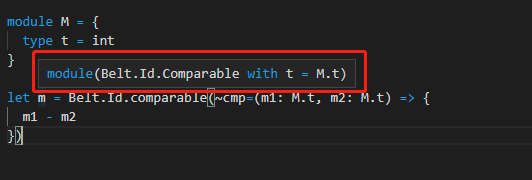How to make an instance of Belt.MutableMap.t?
module M = {
type t = int
}
let m = Belt.Id.comparable(~cmp=(m1: M.t, m2: M.t) => {
m1 - m2
})
I got the type tip of m, but do not understand the meaning of it.

How to make an instance of Belt.MutableMap.t?
module M = {
type t = int
}
let m = Belt.Id.comparable(~cmp=(m1: M.t, m2: M.t) => {
m1 - m2
})
I got the type tip of m, but do not understand the meaning of it.

You need to use a first-class module to create a custom Belt.MutableMap.t. IMO, the first-class modules aren’t very well documented yet, but the basic idea is that they turn modules into values. Ordinarily, modules (module M = ...) and values (let x = ...) live on different “layers” of the language, and they can’t interact directly. With first-class modules, you can pass a module to a function like it was a value.
Here’s a working example. The easiest way is generally using Belt.Id.MakeComparable.
module M = {
type t = int
let cmp = (m1: t, m2: t) => m1 - m2
}
// Create an new Id module
module M_Id = Belt.Id.MakeComparable(M)
// use module() to turn M_Id into a first-class module
let map = Belt.MutableMap.make(~id=module(M_Id))
Belt.MutableMap.set(map, 1, "a")
You can use Belt.Id.comparable too, although it’s slightly different. It directly creates a first-class module for you. However, due to some advanced type-system quirks, ReScript requires that you “unpack” the FCM into a normal module anyway before you can use it.
module M = {
type t = int
}
// Create an new Id module
module M_Id = unpack(Belt.Id.comparable(~cmp=(m1: M.t, m2: M.t) => m1 - m2))
// use module() to turn M_Id into a first-class module
let map = Belt.MutableMap.make(~id=module(M_Id))
Belt.MutableMap.set(map, 1, "a")
Thanks, it seems like that the first class module is not wtitten in documentation.